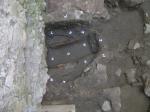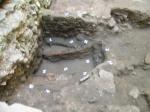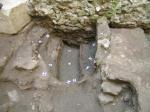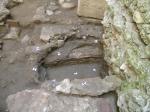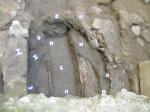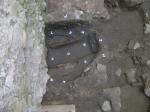Interpretation
-
- This stiff grey clay acts as an armature for the bell casting process. If 3133 is the charred remains of the bell mold, then it can be said that 3130 abuts this context. It seems to have been used as filler and binding agent for all the components needed for casting.
-
- Megan McNamee
- 4-7-2007
Stratigraphic Relationships
- No Linked Records
Description
- color, compaction, composition
- trowel, hand-pick
- N-S: 1.90 m; E-W: 1.02 m
- clay
- dark greenish gray
- firm
- well preserved
- artificial
- large and small chunks of carbon, bones, shells and burnt clay
- ceramic, worked marble, bronze fragments and brick fragments
- A tongue of dense dark greenish-gray clay which passes under and acts as an armature 3133. Near the south wall it takes the form of the bell casting unit and is cut into levels of concentric circles, each at a different level. Without this area, it is a flat layer of clay lacking any sculptural qualities.
- The upper layers of this context are cut for the foundation of the south wall of the chapel, but the lower areas extend under the foundation.
- late medieval/renaissance fragments of ceramic found throughout
- high
Ceramic Inventory
- 1250 AD - 1350 AD
- Probabilmente fine XIII, al massimo inizio XIV
| Total fragments | |
|---|---|
| 3 | |
| 1 | |
| 7 | |
| 2 | |
| 1 |
Basic Information
- Layer of dark greenish-grey clay running N/S through center of chapel--foundation for bell casting pit.
Architectural Elements
Record Details
-
- Lisa Fentress
-
- Caroline Goodson
- 4-7-2007
- Megan McNamee
- 21-6-2007
